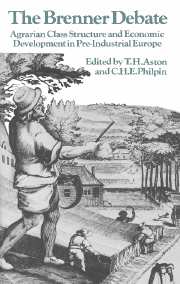Book contents
- Frontmatter
- Contents
- Preface
- Introduction
- 1 Agrarian Class Structure and Economic Development in Pre-Industrial Europe
- 2 Population and Class Relations in Feudal Society
- 3 Agrarian Class Structure and the Development of Capitalism: France and England Compared
- 4 Peasant Organization and Class Conflict in Eastern and Western Germany
- 5 A Reply to Robert Brenner
- 6 Against the Neo-Malthusian Orthodoxy
- 7 A Crisis of Feudalism
- 8 In Search of Agrarian Capitalism
- 9 Agrarian Class Structure and Economic Development in Pre-Industrial Bohemia
- 10 The Agrarian Roots of European Capitalism
- Index
- Past and Present Publications
7 - A Crisis of Feudalism
Published online by Cambridge University Press: 27 October 2009
- Frontmatter
- Contents
- Preface
- Introduction
- 1 Agrarian Class Structure and Economic Development in Pre-Industrial Europe
- 2 Population and Class Relations in Feudal Society
- 3 Agrarian Class Structure and the Development of Capitalism: France and England Compared
- 4 Peasant Organization and Class Conflict in Eastern and Western Germany
- 5 A Reply to Robert Brenner
- 6 Against the Neo-Malthusian Orthodoxy
- 7 A Crisis of Feudalism
- 8 In Search of Agrarian Capitalism
- 9 Agrarian Class Structure and Economic Development in Pre-Industrial Bohemia
- 10 The Agrarian Roots of European Capitalism
- Index
- Past and Present Publications
Summary
The view that the social system of late medieval western Europe was undergoing a crisis had already been suggested in 1931 by Marc Bloch in his Les caractères originaux de l'histoire rurale française. From 1949, when Edouard Perroy wrote “Les crises du XIVe siècle“ in Annales, the usefulness of the concept as a means of explaining a stage in the history of that system became well established. Interpretations varied considerably. For some, this seemed to be a crisis resulting from a maladjustment of the factors of production. A demographic collapse, followed by an agricultural depression characterized by low grain prices, had already been presented in 1935 by Wilhelm Abel as the most fundamental element. This view, or variations on it, has since become the prevailing orthodoxy, of which Robert Brenner is simply the latest critic. Other historians and economists, while not disputing the importance of the demographic, monetary and other aspects of the crisis to which Perroy, Postan and others drew attention, considered that the crisis was one of a whole socio-economic system. This was primarily a Marxist view, already sketched by Maurice Dobb in his Studies in the Development of Capitalism. It was further explored in the American journal Science and Society and became known as the debate on The Transition from Feudalism to Capitalism. The latest contribution from the Marxist point of view is Crise du féodalisme by Guy Bois, a profound working-out of theoretical issues on the basis of detailed empirical research.
The concept of a general crisis of a social system was, of course, by no means far removed from the experience of historians from about 1930 onwards.
- Type
- Chapter
- Information
- The Brenner DebateAgrarian Class Structure and Economic Development in Pre-industrial Europe, pp. 119 - 137Publisher: Cambridge University PressPrint publication year: 1985
- 12
- Cited by



